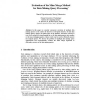Free Online Productivity Tools
i2Speak
i2Symbol
i2OCR
iTex2Img
iWeb2Print
iWeb2Shot
i2Type
iPdf2Split
iPdf2Merge
i2Bopomofo
i2Arabic
i2Style
i2Image
i2PDF
iLatex2Rtf
Sci2ools
151
click to vote
ADBIS
2004
Springer
2004
Springer
Evaluation of the Mine-Merge Method for Data Mining Query Processing
In this paper we consider concurrent execution of multiple data mining queries in the context of discovery of frequent itemsets. If such data mining queries operate on similar parts of the database, then their overall I/O cost can be reduced by transforming the set of data mining queries into another set of non-overlapping queries, whose results can be used to efficiently answer the original queries. We discuss the problem of multiple data mining query optimization and experimentally evaluate the Mine Merge algorithm to efficiently execute sets of data mining queries.
Related Content
| Added | 30 Jun 2010 |
| Updated | 30 Jun 2010 |
| Type | Conference |
| Year | 2004 |
| Where | ADBIS |
| Authors | Marek Wojciechowski, Maciej Zakrzewicz |
Comments (0)

